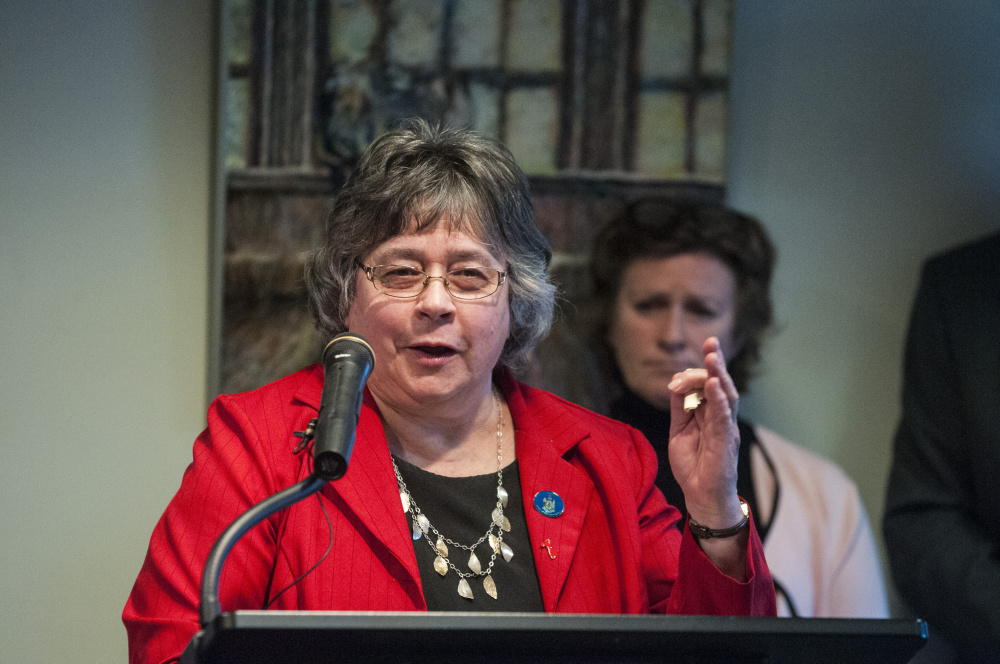BUCKSPORT — Our ongoing Maine public health nursing debate echoes our national debate about what basic health services and personal protections every democratic government should provide.
The LePage administration has chosen to “save money” by destroying public health nursing as we know it. In 2011, 59 public health nurses were serving people from 13 offices across Maine. Now, only 23 positions are filled, although 48 full-time positions are budgeted and funded, and the division is the only one mandated by law. Nurses have no workspace or clerical help and are criticized for not seeing enough patients, though national standards recommend 350 public health nurses in a rural state with our population.
I recently attended the Health and Human Services Committee hearing on L.D. 1108, a bipartisan proposal to rebuild Maine’s public health nurse corps. Over 40 health care providers and system administrators, and a well-spoken patient, testified for over four hours in support of the bill, describing a flawed system where referrals for help from a public health nurse are lost in an unresponsive back office.
I delivered written testimony from Dr. Mark Brown, chief of pediatrics and the neonatal intensive care unit at Eastern Maine Medical Center. I then spoke as a retired EMMC ER doctor, a former Maine Emergency Medical Services Region 4 medical director and Maine EMS Board member, and citizen representative on the post-9/11 Task force to Examine Maine’s Homeland Security Needs.
Dr. Christopher Pezzullo, the state’s chief health officer, provided the only testimony in support of the present system and against L.D. 1108. He proposed hiring a diffuse team of amateurs to make most home visits and coordinate these private and unstable situations. He proposed that a colorful brochure be engineered and that patients “self-refer” for care by leaving a message with a care provider.
Imagine a single mom with several children, no transportation and maybe even no phone, a partner on drugs and/or abusing her and/or the kids physically and/or sexually, and both partners afraid of the law stepping in. One or both may have an exacerbation of a previous mental and/or physical illness. The mom may have post-natal depression. Imagine her pleading for life-saving help to an answering machine!
Babies born of substance-addicted moms are themselves addicted, and can undergo catastrophic withdrawal symptoms, such as seizures and sudden death from cardiac arrhythmias or infections. Withdrawal symptoms are numerous and widely varied, and may occur alone or together in unusual patterns.
The most important thing is to actively and expertly listen to the patient. Many patients intuitively understand much of what is troubling them physically and emotionally, but a scared new mother is not going to confide such intimate issues to a stranger.
A skilled medical practitioner must quickly synthesize multiple symptoms, environmental factors and physical findings into what we call a “working diagnosis.” Then they must make a comprehensive assessment of the entire situation and a treatment plan. This is exactly what public health nurses are trained to do.
Are any bruises from falls or slaps? Are there clear and present dangers in the woman’s or child’s physical or emotional environment? Is the mom worried about getting pregnant again? Does she know how to administer her medicines and the baby’s medicines? Does she really know how to breast-feed?
Is the child screaming from an ear infection or because of life-threatening narcotic and/or sedative withdrawal? Are the vomiting and diarrhea “just the flu”? Is the rash “just a rash”?
During all my years of medical practice, we often talked about the doctor-patient relationship. It was important to know what was going on in our patients’ personal lives, in order to diagnose their physical complaints. The same holds true of the nurse-patient relationship today.
A fully funded and functional public health nursing system would save money in the long run. Home monitoring by nurse specialists can save two to three weeks in the pediatric ICU, costing as much as $28,000 to $56,000.
Newborn babies should be at home bonding with moms and dads in the first few weeks, when it is most crucial. Smiling and talking, cuddling and swaddling and breast-feeding are most important for mild withdrawal, but only under close nursing supervision.
Public health nurses are also fundamental for controlling infectious disease outbreaks. We read daily about the likes of Ebola and Zika; our nurses have also addressed small, local outbreaks of hepatitis, gonorrhea, whooping cough and tuberculosis so well that they never even made the news.
We must all now actively support Maine’s public health care nursing system, and be sure our legislators understand our concerns.
Send questions/comments to the editors.


